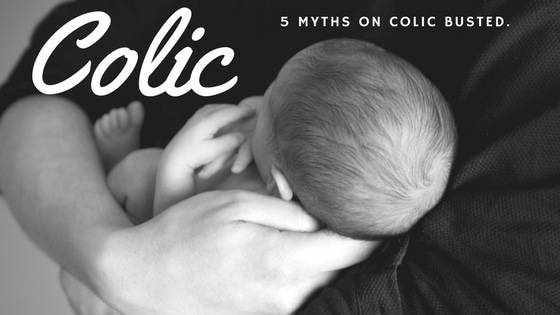Five Myths About Baby Colic Busted
Have you been told your baby has colic or have you googled “my baby won’t stop crying” and the search seems to suggest colic is the culprit? You won’t be alone. Colic is a term that is regularly used to describe unsettled babies, but there is a lot of confusion around what colic actually is, what causes it, what the symptoms are and what you can do.
One thing is for sure, that having a baby with colic is distressing for a baby and hard for parents. Even if you know what colic is before you have your baby or have some experience of friends who have babies who have suffered from it, nothing can quite prepare you for what it feels like to have a colicky baby and the sense of helplessness, frustration and anxiety it can induce. Generally colic is diagnosed if the baby follows the ‘rule-of-three; colic usually lasts for at least three hours a day, for at least three days a week, for at least three weeks. Having had a baby with colic myself, it can seem like your baby is crying for a lot longer than this.
My experience
My daughter suffered from colic and I felt like a bad mother with a baby that did not “like” me. I did not know what to do and dreaded 4pm onwards which I called “the twilight zone”. From this time, my daughter would become inconsolable and what would follow would be 4-6 hours of me trying to settle and calm her in any way I could whilst she screamed in pain unable to relax. I would breastfeed her until I was sore, pace around the house and try all manner of things to try and help her. I felt her pain and saw her distress and felt like I could not do anything right. The end result was self doubt, exhaustion, worry and dread over the next episode of colic which would follow the next day. As a first time mother, I felt drained, unsupported, confused, and ultimately like I could not meet my baby’s needs. A heady mix of emotions twined with a large dose of hormones lead to me feeling out of control and unable to cope. If this sounds familiar, don’t be surprised as between 5% and 19% of infants develop colic. It is a common experience.
I finally took action by going to an infant massage class which helped me accept and cope with my daughter’s colic, let go of any ideas I was holding that I was doing something “wrong” and give me techniques to help her. It also introduced me to my future career as an infant massage instructor which I love. After a few years of teaching infant massage, I designed, researched and wrote my course the “Soothe, Settle & Sleep” program to help other parents like me who were struggling with coping with colic and experiencing guilt and worry. In understanding more about colic I was able to bust some common myths surrounding it.
Myth One: My baby won’t stop crying because I am doing something wrong
This one often goes through the mind of parents. Why does my baby cry so much and her baby doesn’t? Why can’t I settle my baby? What’s wrong with me? Colic is a condition that affects your baby and is not a reflection on you as a parent. I went on to have two more children, neither of whom had colic and settled very easily. I wish I had known with my daughter that colic was going to be a experience we would need to weather together, to learn from together and to cope with together. I took her colic “personally” rather than accepting it. If you are responding to your baby when he/she cries, offering your baby comfort and security, listening to your baby and communicating love and trust, you are doing the best you can to meet your baby’s needs. Letting go of any guilt and frustration is important as studies have shown that parents exposed to colic are more susceptible to symptoms of post natal depression. If you have any medical concerns about your baby, never be frightened to consult your doctor to rule out other conditions.
Myth 2: Colic is caused by wind
Sadly the causes of colic are not known. There are many different theories including overstimulation, lactose intolerance, activity during pregnancy such as smoking or an immature gut. Some professionals suggest its caused by birth trauma. It’s not clear cut which can add to confusion and worry around the condition. It’s causes are a mystery and that contributes to why there is no specific remedy. Interesting, there is a lower rate of colic in tribal societies where babies are held more and carrying in slings.
Myth 3: Colic disappears by three months
This can be the case but not always. Sometimes colic can last longer than this and can also be confused with another condition known as silent reflux or GORD. If your baby has colic like symptoms after four months, it is very important to visit your GP to make sure your baby is healthy and there is no other condition present.
Myth 4: There is nothing you can do to manage colic
It can seem like this but there are things you can do and that I would recommend. These include regular tummy massage, holding your baby, using a sling, warm baths, skin to skin, loose swaddling, movement, baby yoga, keeping baby upright and regular winding. Taking action helps you to feel more confident and empowered managing colic. You can find out more on our website. If your baby is distressed, just you being there and offering support in the way that works for you and your baby is vital to reassure him. If you are finding prolonged crying stressful, try using breathing techniques to help relax your nervous system and reduce tension. Adjusting your breathing rate is the simplest way to bring your body into balance if you are feeling stressed. Although it can be hard, acceptance is key. Just accepting that your baby has colic and that the moment will past is also very important in managing stress and anxiety. Try to focus on positive images and moments with your baby. Get support from friends and family, join an infant massage group or get help from a professional. Whenever you get a chance recharge your energy and nurture yourself. Focus on making things easier now.
Myth 5: I got off to a difficult start with my baby and I have lost the chance to bond with him.
It is true that colic can seem to overshadow everything and affect your feelings towards your baby but bonding is a process and not a discreet event. If you feel that you were not able to nurture feelings of love towards your baby for whatever reason, infant massage, skin contact, touch and baby gazing can help you to deepen your connection and let any feelings of frustration and anger go. Bonding can be enhanced at any age and its never too late. Infant massage has been shown to help with postnatal depression and bonding issues connected with it (Glover, Onozawa & Hodgkinson: 2002; Onozawa, Glover, Adams, Modi & Kumar: 2001).
For more information on infant massage visit www.blossomandberry.com

